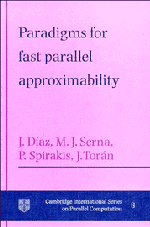
-
Select format
-
- Publisher:
- Cambridge University Press
- Publication date:
- 19 March 2010
- 10 July 1997
- ISBN:
- 9780511666407
- 9780521431705
- 9780521117920
- Dimensions:
- (247 x 174 mm)
- Weight & Pages:
- 0.465kg, 166 Pages
- Dimensions:
- (244 x 170 mm)
- Weight & Pages:
- 0.28kg, 168 Pages
You may already have access via personal or institutional login
Book description
Various problems in computer science are 'hard', that is NP-complete, and so not realistically computable; thus in order to solve them they have to be approximated. This book is a survey of the basic techniques for approximating combinatorial problems using parallel algorithms. Its core is a collection of techniques that can be used to provide parallel approximations for a wide range of problems (for example, flows, coverings, matchings, travelling salesman problems, graphs), but in order to make the book reasonably self-contained, the authors provide an introductory chapter containing the basic definitions and results. A final chapter deals with problems that cannot be approximated, and the book is ended by an appendix that gives a convenient summary of the problems described in the book. This is an up-to-date reference for research workers in the area of algorithms, but it can also be used for graduate courses in the subject.
Reviews
Review of the hardback:‘Required reading for researchers working on parallel algorithms and of interest to anyone working in the area of parallel computing in general.’
Brian Bramer Source: CVu
Contents
Metrics
Full text views
Full text views help Loading metrics...
Loading metrics...
* Views captured on Cambridge Core between #date#. This data will be updated every 24 hours.
Usage data cannot currently be displayed.
Accessibility standard: Unknown
Why this information is here
This section outlines the accessibility features of this content - including support for screen readers, full keyboard navigation and high-contrast display options. This may not be relevant for you.
Accessibility Information
Accessibility compliance for the PDF of this book is currently unknown and may be updated in the future.


